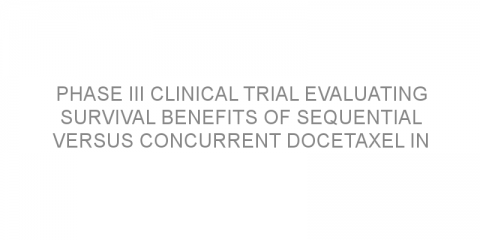In a nutshell This phase II clinical trial tested whether a new drug, entinostat, can work in concert with exemestane (a hormone therapy drug), to fight breast cancer that no longer responds to hormone therapy alone. Some background Some breast cancers need estrogen (a female sex hormone) to grow. These breast cancer cells respond to estrogen via...
Read MoreCurrent stage?-Stage II Posts on Medivizor
Evaluating survival benefits for adding zoledronic acid to chemotherapy in stage II and III breast cancer patients
In a nutshell This study evaluated whether zoledronic acid (Zometa) can help reduce recurrence (return of the cancer) and improve survival for patients with stage II/III breast cancer (BC). Some background Stage II and Stage III BC is cancer that has spread to the lymph nodes around the breast (under the armpit or above collarbone), but not...
Read MorePhase III clinical trial evaluating survival benefits of sequential versus concurrent docetaxel in doxorubicin-based chemotherapy in node-positive breast cancer patients
In a nutshell This phase III clinical trial evaluated the survival benefits after the addition of docetaxel into doxorubicin-based chemotherapy in node-positive breast cancer patients. Some background Node-positive breast cancer means that the cancer has spread to the lymph nodes near the breast such as under the arm or above the collarbone. Women...
Read MorePhysical and Psychological Distress Following Prostate Cancer Diagnosis
In a nutshell This study explored the differences in physical and psychological symptoms experienced by men treated with radical prostatectomy versus watchful waiting, over the course of 8 years. While each treatment option leads to negative symptoms, the level of discomfort and anxiety men felt at diagnosis was suggestive of how they would feel over...
Read MoreUsing a scoring systerm to identify patients who will benefit from chemotherapy
In a nutshell This paper looks at the use of a system called EPclin that gives patients a risk score according to the clinical and genetic characteristics of their tumor. This score is used to predict if patients are at high or low risk of distant reccurrence of the tumor and if they would benefit from chemotherapy. Some background...
Read MoreEfficacy of anti-PD-1 drugs on cancer regression
In a nutshell This review provided the long-term outcomes of the first human trial of the anti-PD-1 drug BMS-936558. It also evaluated whether restarting therapy for cancer recurrences can be effective. Results showed that anti-PD-1 drugs have clinical potential. Some background The PD-1 protein (or "programmed cell death-1" protein)...
Read MoreRisk of Heart Failure after Anthracycline (Adriamycin/Daunomycin) and Trastuzumab (Herceptin) Treatments for Breast Cancer
In a nutshell This study evaluated the risk of heart disease associated with two commonly prescribed treatments for breast cancer. The main finding was that Trastuzumab (Herceptin) and Anthracycline (Adriamycin/Daunomycin) treatments are associated with a higher risk of heart failure or ‘cardiomyopathy’. Some background Anthracyclines...
Read MoreThe right treatments are available if the correct trials are used to show that therapy is improving.
In a nutshell This editorial article published at The Journal of Clinical Oncology, expresses experts' opinion, criticizing the current practice and design of clinical trials involving patients with rectal cancer. Some background Despite improvements in treatment options, such as the addition of the platinum-based drug Oxaliplatin to...
Read MoreCan patients with rectal cancer be treated with pre-operative chemoradiation alone?
In a nutshell The present study evaluated the outcomes of patients with rectal cancer who were treated with non-operative management (NOM) after complete clinical response (cRC) to neoadjuvant chemoradiation (nCRT). Some background Rectal cancer involves the final part of the large intestine, or rectum. The first choice of treatment for...
Read MoreThe pathways followed by doctors in the diagnosis and treatment of recurring and metastatic breast cancer
This paper evaluates the process health care professionals follow to diagnose a cancer that reoccurs in the same location as a previous cancer (locally recurrent), or a cancer that has spread (metastasized). Despite earlier detection and improved treatment options for breast cancer, it is still the leading cause of cancer related deaths in...
Read MoreGuidelines for colonoscopy surveillance after removal of colorectal cancer
In a nutshell This review presents the recommendations of The American Cancer Society and the US Multi-Society Task Force on the use of colonoscopy for the follow up of patients with resected colorectal cancer (CRC). Some background Patients who undergo surgery for CRC with curative-intent (complete removal of the cancer) are candidates for...
Read MoreTowards guidelines to prevent colorectal cancer recurrence
This article presents results of recent studies concerning the interplay between the body's chemistry and behavioral factors that influence colorectal cancer (CRC) recurrence. Recent advances in CRC treatment have produced new and promising biological treatments. However, tumors sometimes have unique features that render many of these therapies...
Read More














